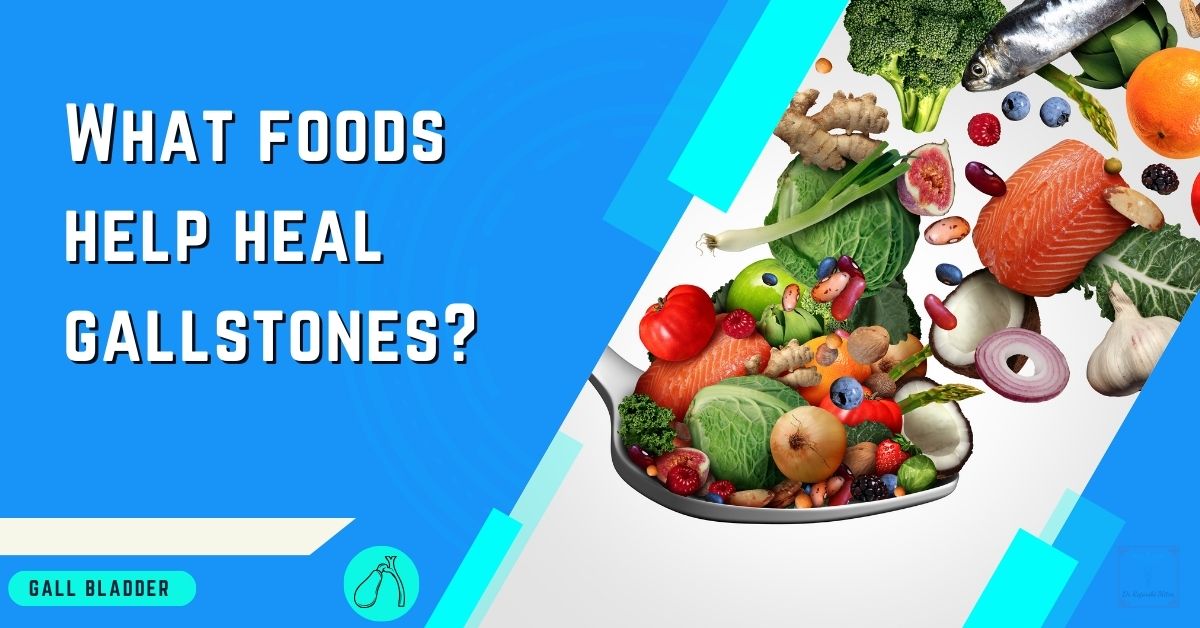The foods you regularly eat can have a major impact on healing existing gallstones and preventing new ones from forming. As your surgeon, I want to provide guidance on beneficial foods to incorporate into your diet to support gallbladder health and potentially dissolve small stones.
Foods to Help Heal Gallstones:
1. Fresh Fruits and Vegetables
Fruits and veggies high in fiber like pears, apples, berries, broccoli, spinach, and avocados help maintain a healthy weight and reduce bile cholesterol saturation.
2. Cold Water Fish
Fish like salmon, mackerel, and tuna provide anti-inflammatory omega-3s that can help reduce gallstone-related pain and inflammation.
3. Nuts and Seeds
Almonds, walnuts, chia, and flax seeds contain healthy unsaturated fats and vitamin E, a key antioxidant for gallbladder health.
4. Olive Oil
Research shows olive oil may help dissolve small cholesterol gallstones when consumed regularly. Its monounsaturated fats don’t overload the liver.
5. Legumes and Tofu
Beans, lentils, peas, and tofu provide plant-based proteins and amino acids that benefit gallbladder function.
6. Herbal Teas
Drinking chamomile, green, or milk thistle tea helps reduce gallbladder inflammation. Stay well-hydrated.
7. Low-Fat Dairy
Opt for low-fat milk, yogurt, and cheeses to get calcium without excess saturated fats.
8. Whole Grains
High-fiber whole grains like brown rice, oats, and quinoa regulate blood sugar and promote a healthy weight.
Other foods that may help to heal gallstones
In addition to the foods listed above, there are a few other foods that may help to heal and relieve gallstone symptoms. These foods include:
Apple cider vinegar:
Apple cider vinegar is a natural remedy that has been used for centuries to treat a variety of health problems, including gallstones. Some people believe that apple cider vinegar can help to dissolve gallstones.
Dandelion root tea:
Dandelion root tea is another natural remedy that has been used to treat gallstones. Some people believe that dandelion root tea can help to stimulate the gallbladder and improve bile flow.
Turmeric:
Turmeric is a spice that has anti-inflammatory and antioxidant properties. Some people believe that turmeric can help to reduce inflammation and pain associated with gallstones.
Foods to avoid with gallstones
If you have gallstones, it is important to avoid certain foods that can trigger symptoms and complications. These foods include:
Fatty foods:
Fatty foods can cause the gallbladder to contract and release bile, which can lead to pain and inflammation.
Fried foods:
Fried foods are high in saturated and trans fats, which can increase your risk of developing gallstones.
Spicy foods:
Spicy foods can irritate the gallbladder and cause pain.
Sugary foods:
Sugary foods can lead to weight gain, which is a risk factor for developing gallstones.
Carbonated drinks:
Carbonated drinks can cause gas and bloating, which can put pressure on the gallbladder and lead to pain.
Other tips for managing gallstones
In addition to following a healthy diet, there are a few other things you can do to manage gallstones and prevent complications. Staying physically active can aid in maintaining a healthy weight and reducing the risk of gallstone formation. Additionally, some people explore various home remedies and natural treatments, believing in the fastest methods to cure gallstones, although it’s crucial to consult a healthcare professional before trying these approaches. Regular medical check-ups can also help monitor your condition and catch any potential issues early on.
These include:
Maintaining a healthy weight:
Being overweight or obese increases your risk of developing gallstones. Losing weight can help to reduce your risk and improve gallbladder health.
Exercise regularly:
Exercise helps to keep your weight under control and can also help to improve gallbladder function.
Drink plenty of fluids:
Staying hydrated helps to keep the gallbladder healthy and can help to prevent gallstones from forming.
Avoid crash diets:
Crash diets can lead to rapid weight loss, which can increase your risk of developing gallstones.
If you have gallstones, it is important to follow a healthy diet and lifestyle to manage your condition and prevent complications. Eating a diet that is low in saturated and trans fats, high in fiber, and includes plenty of fruits and vegetables can help reduce your risk of developing gallstones and improve gallbladder health.
Summary of Key Points:
– Eat plenty of fruits, vegetables, legumes, nuts and whole grains.
– Incorporate cold water fish for anti-inflammatory omega-3s.
– Use olive oil as your primary cooking oil.
– Choose low-fat dairy products.
– Stay well-hydrated with herbal teas.
– Follow an overall heart-healthy diet tailored for your gallbladder.
– Losing weight can help shrink existing stones.
Let me know if you have any other diet-related questions about managing gallbladder stones naturally!



















